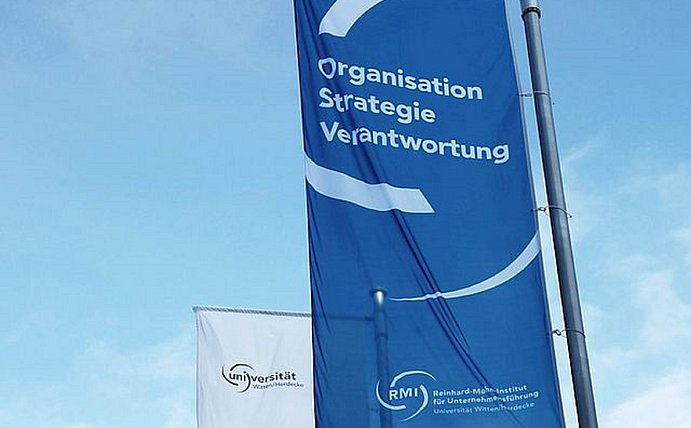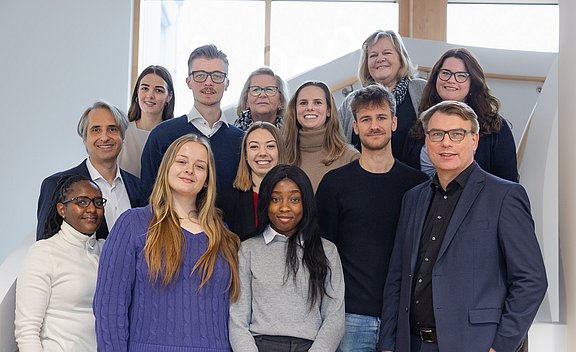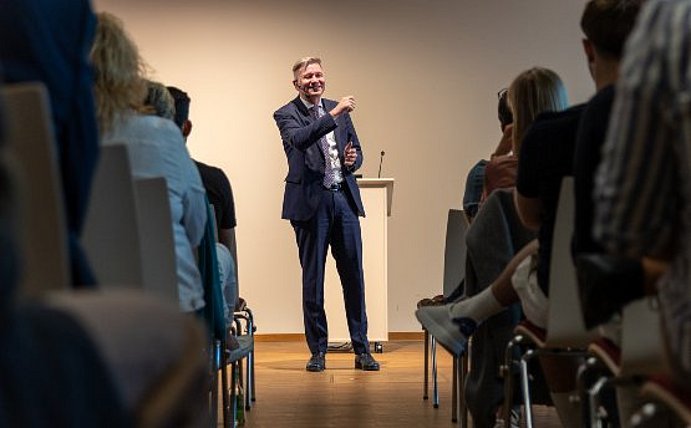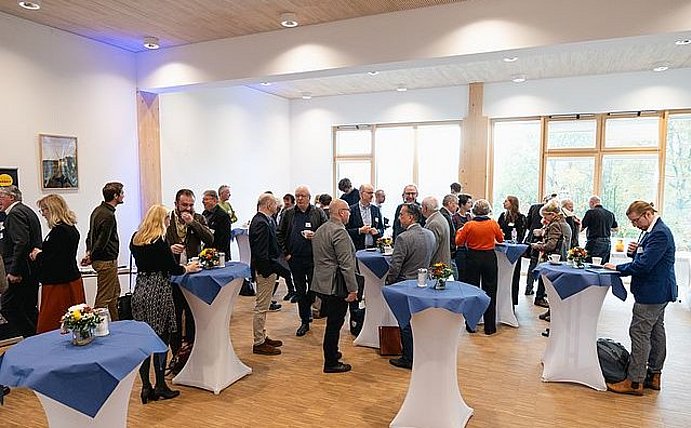
Reinhard-Mohn-Institut (RMI)
Für innovative Unternehmensführung
Das Reinhard-Mohn-Institut für Unternehmensführung (RMI) setzt sich national und international für die Reform der Unternehmensführung in Theorie und Praxis ein. Es folgt der Führungsphilosophie von Reinhard Mohn, die auf praktischen Erfahrungen und verantwortungsvollem Umgang mit Menschen basiert.
Das Institut legt großen Wert auf praktische Relevanz und den Austausch mit Unternehmen. Es betrachtet Strategie, Management, Organisation und Steuerung als unternehmensübergreifende Aufgaben und fördert kooperative Unternehmensführung in Netzwerken.
Der „RMI Tag der Unternehmensführung“ ist ein renommiertes, jährliches Symposium auf dem Campus der Universität Witten/Herdecke mit führenden Referenten.
Seit seiner Gründung wird das Institut von der Bertelsmann Stiftung gefördert.
News am RMI
Veranstaltungen am RMI
Forschung im engen Austausch mit der Wirtschaft
Das Institut orientiert sich in seiner Forschung an der Partnerschaftsphilosophie von Reinhard Mohn. „Kooperation“ ist ein zentrales Thema in allen Projekten. Das RMI untersucht zum Beispiel, wie man Innovationsnetzwerke managt oder wie die Zusammenarbeit in Teams funktioniert. Jedes Jahr sammelt das Institut zusammen mit der Bertelsmann Stiftung Daten zu den Führungsbedingungen in Deutschland mit dem „Führungskräfte-Radar“.
Aktuelle Forschungsprojekte
Abgeschlossene Forschungsprojekte

Publikationen
Alle Publikationen des Reinhard-Mohn-Instituts der UW/H werden nach und nach in der Hochschulbibliographie erfasst.
Praxisnahe Lehre und ethische Verantwortung
Das RMI ist Teil der Lehrangebote an der Fakultät für Wirtschaft und Gesellschaft. Es bietet praxisnahe Kurse an und unterstützt mehrere Lehrstühle. Die Studierenden können ihre eigenen Erfahrungen und Ideen einbringen, da die Gruppen klein sind und der Austausch mit den Dozierenden intensiv ist. In Praxisseminaren arbeiten die Studierenden an echten Unternehmensproblemen und präsentieren ihre Lösungen den Führungskräften der Unternehmen. Außerdem halten regelmäßig Experten aus bekannten Unternehmen, Start-ups und Hidden Champions Vorträge über Management-Herausforderungen und arbeiten gemeinsam mit den Studierenden an Lösungen. Das RMI legt auch großen Wert auf die ethische Verantwortung der Führungskräfte. Im Bereich Wirtschaftsethik lernen die Studierenden anhand realer Fallbeispiele, ethische Fragestellungen zu verstehen und ein entsprechendes Verantwortungsbewusstsein zu entwickeln.
Das RMI auf Social Media
Leitung

Univ.-Prof. Dr.
Guido Möllering
Direktor
Fakultät für Wirtschaft und Gesellschaft (Department für Management und Unternehmertum) | Reinhard-Mohn-Institut für Unternehmensführung
- +49 2302 926-501
Orcid-ID: 0000-0003-1157-7289
Alfred-Herrhausen-Straße 50
58455 WittenRaumnummer: E.095
Unser Team


Dr.
Philipp Degens
Wissenschaftlicher Mitarbeiter
Fakultät für Wirtschaft und Gesellschaft (Department für Management und Unternehmertum) | Reinhard-Mohn-Institut für Unternehmensführung
Alfred-Herrhausen-Straße 50
58455 WittenRaumnummer: E.093

Raphaela Fritz, M. Sc.
Wissenschaftliche Mitarbeiterin
Reinhard-Mohn-Institut für Unternehmensführung
Alfred-Herrhausen-Straße 50
58448 WittenRaumnummer: C-E.098

Claudia Galys
Assistenz
Fakultät für Wirtschaft und Gesellschaft (Department für Management und Unternehmertum) | Reinhard-Mohn-Institut für Unternehmensführung
Alfred-Herrhausen-Straße 50
58455 WittenRaumnummer: E.094

Charlotte Glienke, M. A.
Wissenschaftliche Mitarbeiterin
Fakultät für Wirtschaft und Gesellschaft (Department für Management und Unternehmertum) | Reinhard-Mohn-Institut für Unternehmensführung
Alfred-Herrhausen-Straße 50
58455 WittenRaumnummer: E 91

Dr.
Simone Schiller-Merkens
Wissenschaftliche Mitarbeiterin
Fakultät für Wirtschaft und Gesellschaft (Department für Management und Unternehmertum) | Reinhard-Mohn-Institut für Unternehmensführung
Alfred-Herrhausen-Straße 50
58455 WittenRaumnummer: E.098

Nicole Steller, M. Sc.
Wissenschaftliche Mitarbeiterin
Reinhard-Mohn-Institut für Unternehmensführung
Alfred-Herrhausen-Straße 50
58455 WittenRaumnummer: E.093

Hon.-Prof. Dr.
Rainer Strack
Honorarprofessor
Reinhard-Mohn-Institut für Unternehmensführung
Alfred-Herrhausen-Straße 50
58455 Witten
Dr.-Ing. Hon.-Prof.
Gunther Thielen
Honorarprofessor
Reinhard-Mohn-Institut für Unternehmensführung
Alfred-Herrhausen-Straße 50
58455 Witten
Johanne von Danwitz, M. Sc.
Wissenschaftliche Mitarbeiterin
Fakultät für Wirtschaft und Gesellschaft (Department für Management und Unternehmertum) | Reinhard-Mohn-Institut für Unternehmensführung
Alfred-Herrhausen-Straße 50
58455 WittenRaumnummer: C-E.098

Univ.-Prof. Dr.
Hendrik Wilhelm
Professur für Strategische Organisation
Fakultät für Wirtschaft und Gesellschaft (Department für Management und Unternehmertum) | Reinhard-Mohn-Institut für Unternehmensführung
Alfred-Herrhausen-Straße 50
58455 WittenRaumnummer: E.096

Helga Wüst
Assistenz
Fakultät für Wirtschaft und Gesellschaft (Department für Management und Unternehmertum) | Reinhard-Mohn-Institut für Unternehmensführung
Alfred-Herrhausen-Straße 50
58455Raumnummer: E.094
Kuratorium
Das Reinhard-Mohn-Institut verfügt über ein Kuratorium mit beratender, mitgestaltender und überwachender Funktion. Es umfasst folgende Mitglieder:
Hannes Ametsreiter (Vorsitzender), Vorstandsvorsitzender der Bertelsmann Stiftung
Prof. Dr. med. Martin Butzlaff (Stv. Vorsitzender), Präsident der Universität Witten/Herdecke
Dr. Immanuel Hermreck, Personalvorstand der Bertelsmann SE & Co. KGaA
Dr. Brigitte Mohn, Mitglied des Vorstands der Bertelsmann Stiftung
Liz Mohn, Ehrenmitglied des Kuratoriums der Bertelsmann Stiftung
Dr. Monika Olivo, Kaufmännische Leitung der Fakultät für Wirtschaft und Gesellschaft, Universität Witten/Herdecke
Univ.-Prof. Dr. Dirk Sauerland, Dekan der Fakultät für Wirtschaft und Gesellschaft, Universität Witten/Herdecke
Katharina Weghmann, Partner bei EY Forensic & Integrity Services, Head of Integrity

